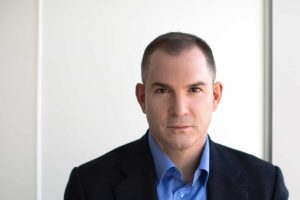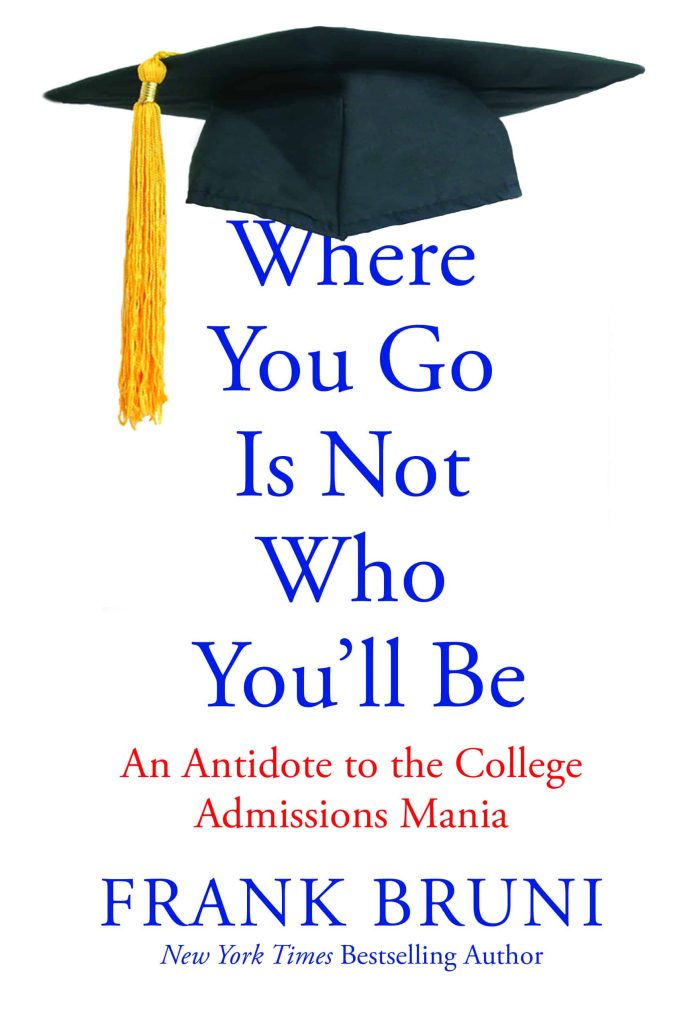
Are you freaking out about your teenager getting into an elite college or universities?
If you are, you need to read the following guest column by Frank Bruni, a New York Times Op-Ed columnist, who has created a powerful antidote for the Ivy League jitters.
In his excellent book, Where You Go Is Not Who You’ll Be: An Antidote to the College Admissions Mania, Bruni methodically attacks the ridiculously stubborn myth that you need some sort of golden ticket to succeed in life and that these precious passes are typically only available at the universities that are older than the American Revolution.
I agree with Bruni, who offered to write this great guest blog post, that this is utter nonsense. Lynn O’Shaughnessy
By Frank Bruni
For the past 30 years, I’ve been working as a journalist. For the past 20, I’ve been at The New York Times, where I’ve written about campaigns and presidents and politics, Greece and Italy and Israel, corporate leaders and movie directors and movie stars. Because of that I’ve been fortunate to meet standouts and overachievers in all walks of life.
Not once have I paused and said to myself, “Wow! So many of them graduated from the Ivy League!”
Because it isn’t true. Some of them did go to the country’s most highly selective institutions of higher learning. More didn’t. All in all they were distinguished by their drive, not by their diplomas, which didn’t fall into any pattern and which certainly didn’t support the narrative—which has grown ever louder over the last decade—that the Ivy League and its ilk have some sort of monopoly on, or at least special claim to, corner offices and top jobs in this country.
That discrepancy is what motivated me to write Where You Go Is Not Who You’ll Be and why I feel so strongly about it and about this whole issue. I look around me at the kids of my friends and peers—I’m 50-years old, and I live on the Upper West Side of Manhattan—and at my 11 nieces and nephews, and I see how frenzied the college admissions process has become and how much anxiety has been pumped into it, at least among those Americans blessed enough not to be worrying first and foremost about whether they’ll be able to afford college.
And then I look at friends and colleagues and see something at odds with that, which is to say that I see the graduates of a broad diversity of schools. It’s funny: When I’ve challenged the notion that the Ivy League is everything in the pages of the New York Times, I’ve had readers write in and say, “Oh, yeah? Tell me where you and your colleagues went to college. I bet it was the Ivy League.”
In many cases, yes. In just as many, no. As I write in the book:
My own undergraduate degree is from the University of North Carolina . . . When I became an op-ed columnist for the Times in June 2011, I joined a group of accomplished writers that  includes Maureen Dowd, who got her bachelor’s degree from Catholic University, and Gail Collins, who got hers from Marquette. Nicholas Kristof and Ross Douthat indeed went to Harvard and David Brooks to the University of Chicago. But Joe Nocera is an alumnus of Boston University, Charles Blow of Grambling State. Tom Friedman spent his first years in college at the University of Minnesota, after which he transferred to Brandeis.
includes Maureen Dowd, who got her bachelor’s degree from Catholic University, and Gail Collins, who got hers from Marquette. Nicholas Kristof and Ross Douthat indeed went to Harvard and David Brooks to the University of Chicago. But Joe Nocera is an alumnus of Boston University, Charles Blow of Grambling State. Tom Friedman spent his first years in college at the University of Minnesota, after which he transferred to Brandeis.
When I began writing the book, I was a visiting faculty member at Princeton, which brings in a fresh batch of journalists every semester to teach small seminars. With me there was a colleague from the Times, David Kocieniewski, who’d won a Pulitzer Prize just a few years earlier. In the book I recount:
He reveled in the irony of that. About three decades earlier, Princeton had rejected him. So had Harvard. Brown, too. SUNY Binghamton was one of his fallbacks, and he told me that because its students fancied themselves freer spirits than most, “They used to call themselves the Brown of public universities, though I’ve never heard anyone at Brown call it the SUNY Binghamton of the Ivies.”
He said that going there was a mercy of sorts, as he would have had trouble affording a private college. But even with the in-state tuition break he got, he had to work his way through school, and for the first two years, he put in 15 hours a week as a janitor. It was one of many unglamorous gigs over the years, including a stint in his early twenties as the driver of a Mister Softee ice cream truck in Buffalo. “Ah, the summer of Softee,” he said. “It’s the worst job ever. You work every sunny day. You’re off when it rains. And you have no idea how many impotence jokes there are until you’ve driven a Mister Softee truck.”
I’m fond of David’s story for several reasons, including the reminder that it provides of the many different paths that people travel to professional success. As I learned when I did the book and I interviewed and constructed profiles of the following people, Howard Schultz, the chief executive of Starbucks, who was on the cover of Time magazine just weeks ago, graduated from Northern Michigan University. Condoleezza Rice, the former secretary of state, did her undergraduate work at the University of Denver. The alma mater of Christiane Amanpour, the CNN correspondent, is the University of Rhode Island. The alma mater of Junot Diaz, the Pulitzer Prize-winning novelist, is Rutgers University.
Speaking to them and others like them, I was struck by their intelligence (of course) and gumption. I was struck by the fact that because they hadn’t gone to the most revered schools in America, they never expected their diplomas to do their work for them or saw those degrees as insurance policies. This was a good thing. And I was struck by the ways in which each of them had extracted from the schools they attended precisely what they needed or exactly what that school could best offer them. I go into this in more detail in the book.
But I mention it here, and I end with it, because what we desperately need to do in this country is change the focus of the discussion from where you go to college to how you use college. In what directions do you need to grow? In what ways does your frame of reference need broadening? If kids were coached to worry about that, and not about the college name splashed across the sweatshirts they’re wearing, they’d be better for it. All of us would.

Great info, confirms what’s in the book David and Goliath by Malcolm Gladwell. You excel at schools where you’re in the top 30%, especially if you’re a STEM major. Don’t be enamored with a school where you’d be in the lower 70%. I speak from experience with how we pursued college with our oldest two. We’ll be doing things differently with our youngest.
I blame US News for 90% of the frenzy. Before their rankings became entrenched in the American psyche (from about the late 80’s on), people used to use their own brains, research, and common sense to choose a college. I think we’d all be a lot better off if these rankings, especially US News, would go away, or if people wouldn’t follow them so blindly. They are not educational experts, and their methodology is suspect at best. There are colleges on the US News “top tier” list (and I despise that phrase, “top tier,” for its elitist tone that presumes to know which colleges are the best for everyone) that 20 years ago were largely commuter and/or party schools for wealthy, not-so-academic kids (NYU and USC come to mind…). Just because they were research oriented and expensive, US News pumped them up on their rankings, and now they are highly sought after. Not because they’ve change all that much or added spectacular programs, but because US News says it’s so. Really people? I bet they haven’t changed all that much in their quality, but because US News says they’re awesome, it’s like gospel to the American public. And why does US News continually insist on ranking research schools with large graduate programs highly in UNDERGRADUATE rankings? These types of settings actually detract from a high quality undergraduate experience. Students at large research schools, with large numbers of grad students, are likely to have extremely large classes, many of which are taught by teaching assistants. People — do your own research, and stop blindly following US News. Stop being sheep. In fact, do yourselves a favor, and don’t even look at it!
This article could not have come at a better time in our house. My daughter, with perfect GPA and very high test scores, has received mail from Harvard, Princeton, Penn, Yale, etc.in the last two weeks. We were beginning to think that we should really spend/borrow the $240,000+ total to attend these schools. (We are full pay, by calculation, but cannot really afford it.) We were starting to get sucked up in the Ivy hype. We are going to settle down and read this book.
Thanks for the guest post!
I completely agree, but even if parents are on board and encouraging this sort of mindset, how do we convince our kids?
My son came to me sophomore year asking to go on the East Coast college tour with his high school (we’re in California), where they visit many of the Ivy League schools, and other prestigious universities. I asked, “Since when have you been interested in Ivy League schools?” and he answered, “I always have.” I homeschooled this kid for four years before high school, and I had no clue. He went to a really fabulous college prep high school in LA, and the atmosphere breeds this type of thinking. (He will be graduating from Georgetown in May, and it’s been a fabulous fit for him.)
Right now, my daughter is in the midst of college decisions, still waiting on a few more, and although she’s received more than a few 50% merit scholarships at regional universities, she’s got her mind set on more prestigious East Coast schools, too. When I tried to convince her with the same verbiage as in your post above, her response was, “Well, why did I work so hard, then? I could have gotten into those colleges without even trying.” In that respect, her perspective was more understandable. It’s very difficult to convince your overachieving kid to lower their standards when it comes to choosing a college; it’s the right thing to do, it’s just not very easy.
I have just purchased this book and will recommend it to my clients in my college admissions consulting practice. It is so true that American families have been caught up in the illusion that it is necessary to attend Ivies or similarly elite undergraduate institutions in order to become a success in life. So much effort is spent checking all the boxes to be accepted to the dream college that some students are burnt out before they arrive at the freshman dorm, just when the game really begins.
I try to help these families see that “fit” (based on programs, family financial situation, school atmosphere, career goals) is way more important than “bumper sticker bragging rights.” Moreover, a student’s choice of major, academic performance, internships, and research projects WHILE IN COLLEGE matter much more than the exact name brand of the college he or she attends; sadly, I do not see enough emphasis on this aspect of a young adult’s career preparation. Too often once a student is accepted to the desired college, parents heave a sigh of relief—but it’s way too soon to do that!
As Nelson Mandela once said: “”After climbing a great hill, one only finds that there are many more hills to climb. “
What you say is so true Kris. Simply getting into a prestige school means nothing and relaxing at that point is foolish.
Lynn O.